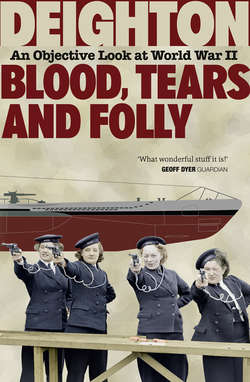Читать книгу Blood, Tears and Folly: An Objective Look at World War II - Len Deighton - Страница 46
Soldiers go home
ОглавлениеAt the end of the Great War the armies went home, and it was the attitudes and actions of these returning soldiers which created the world that went to war in 1939. Virtually all the men returning from the battlefields were to some extent cynical and embittered as they compared what they and their comrades had suffered with what others, less worthy, had gained. Most of the veterans’ associations – from the Croix de feu in France to Oswald Mosley’s Blackshirts in Britain – were anti-Communist. Communists had conspicuously associated themselves with pacificism and anti-militarism. Returning soldiers despised the men who had stayed at home preaching against the war.
Despite its new democratic government, a defeated Germany was convulsed in a series of localized revolutions as left-wing and right-wing political groups fought for power. There were violent uprisings in many German cities and for a few days Bavaria had ‘a Soviet Republic’. Many German institutions – the army, big business and the labour movement – had survived the war intact; now each threw its weight behind the factions it favoured.
The government of this fragile republic saw its prime tasks as protecting the government from Communist takeover and keeping public order. To do this it came to terms with the highly organized veterans’ organizations: most notably the Freikorps, a huge patchwork of small armies, illicitly armed and ready to fight all-comers. Such units were used as an armed frontier guard against Polish incursions and as a secret supplement to the army permitted by the peace treaty. At first Freikorps men wore their old army uniforms. Later they were issued with a consignment of shirts originally intended for German soldiers in East Africa. Dressed in them, these men became the brown-shirted Sturm Abteilung – storm-troops – who eventually allied themselves to Hitler’s Nazi party to be its tough uniformed auxiliaries.16
Few of the veterans were looking for personal material gain. Life in the front line had shown them a special sort of comradeship, a world in which men literally sacrificed themselves for their fellows. The ex-servicemen were looking for such a new idealistic world in peacetime too. In Russia Lenin had not waited for an end to hostilities before harnessing the energies of the soldiers to his Communist revolution. In Italy Benito Mussolini offered such men a uniformed Fascist state. But it was Adolf Hitler, in Germany, who most skilfully designed a political party that could manipulate the ex-servicemen. The declared aims and intentions of the National Socialist German Workers’ party swept away their cynical disillusion with politics and transformed such veterans into ardent Nazis.
